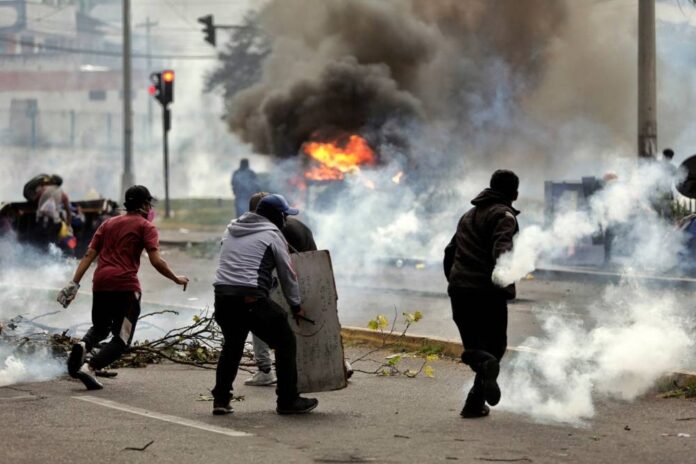Demonstrators clash with the police in the surroundings of Arbolito Park in Quito on June 23, 2022, in the framework of indigenous-led protests against the government. – AFP pic
Follow us on Instagram, subscribe to our Telegram channel and browser alerts for the latest news you need to know.
QUITO, June 24 – Police in Ecuador’s capital fired tear gas yesterday to disperse Indigenous protesters who tried to storm congress on the 11th day of crippling demonstrations over fuel prices and living costs.
Protesters had earlier won a concession from the Ecuadoran government when President Guillermo Lasso, isolating because of a Covid-19 infection, granted them access to a cultural centre emblematic of the Indigenous struggle but commandeered by police over the weekend.
However, later in the day, a group of Indigenous protesters, led by women, headed towards congress only to be pushed back by police as violent clashes broke out.
Police fired tear gas while protesters threw rocks and fireworks.
“This is a very bad sign, given we asked our base to march peacefully,” said protest leader Leonidas Iza.
The protests, which started on June 13, have claimed the lives of three people and have seen the government impose a state of emergency on six of the country’s 24 provinces.
An estimated 14,000 protesters are taking part in the mass show of discontent, and some 10,000 of them are in Quito, which is under a night-time curfew.
The protesters’ demands include a cut in already subsidised fuel prices which have risen sharply in recent months, as well as jobs, food price controls, and more public spending on healthcare and education.
‘For the sake of dialogue’
Francisco Jimenez, Ecuador’s minister of government, announced the concession earlier Thursday, saying it was made “for the sake of dialogue and peace.” The aim, he said, was to “to stop roadblocks, violent demonstrations, and attacks.” The protesters hailed the move.
“It is a triumph of the struggle,” Iza proclaimed over a megaphone, advancing on the center with hundreds of others in jubilatory mood.
The Alliance of Human Rights Organisations said a 38-year-old man died on Wednesday in the southern town of Tarqui in clashes between protesters and police, which it accused of violent tactics.
Dozens of people have also been injured in the countrywide demonstrations that Indigenous groups have vowed to continue until their demands are met.
The police, for its part, said the man had died of a medical condition that occurred “in the context of the demonstrations.” Two other people died on Monday and Tuesday, according to the Alliance, which also reported 92 wounded and 94 civilians arrested in 11 days of protests.
Officials say 117 in the ranks of police and soldiers have been injured.
On Wednesday night, some 300 protesters occupied a power plant in southern Ecuador and briefly took its operators hostage, authorities said.
Ecuador, a small South American country riddled with drug trafficking and related violence, has been hard hit by rising inflation, unemployment and poverty – all exacerbated by the pandemic.
US$50 million per day
The protests, which have involved the burning of tires and tree branches by vocal marchers brandishing sticks, spears and makeshift shields, have paralyzed the capital and severely harmed the economy with barricades of key roads.
The government has rejected demands to lift the state of emergency imposed in response to the sometimes violent demonstrations called by the powerful Confederation of Indigenous Nationalities of Ecuador (Conaie).
“I cry to see so many people mistreated by this… government,” protester Cecilia, an 80-year-old who did not give her full name, told AFP as she marched with an Ecuadoran flag and a banner reading: “Lasso, liar.”
Conaie led two weeks of protests in 2019 in which 11 people died and more than 1,000 were injured, causing economic losses of some US$800 million (RM3.5 billion) before the then-president abandoned plans to reduce fuel price subsidies.
Lasso’s government has ruled out cutting fuel prices this time, as it would cost the State an unaffordable US$1 billion per year.
Conaie – credited with ending three presidencies between 1997 and 2005 – insists the state of emergency be lifted before it will negotiate, but the government has said this “would leave the capital defenceless.” It was unclear whether the group was ready to negotiate after yesterday’s concession.
Official data showed the economy was losing about US$50 million per day due to the protests, not counting oil production – the country’s main export product – which has also been affected.
Producers of flowers, another of Ecuador’s main exports, have complained their wares are rotting as trucks cannot reach their destinations. – AFP


